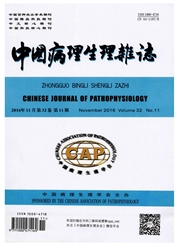

 中文摘要:
中文摘要:
目的: 通过离体及在体实验,观测2种新型大麻类制剂O-1602和大麻二酚(CBD)对脂多糖(LPS)诱导的啮齿动物小肠运动紊乱的影响,并探讨其可能的机制。方法: LPS腹腔注射复制小鼠小肠运动紊乱模型,碳末悬液灌胃评估小肠排推功能,Western blotting 测定回肠G蛋白偶联受体55(GPR55)的表达,ELISA法检测血清肿瘤坏死因子α(TNF-α)和白细胞介素6(IL-6)水平。LPS与大鼠、小鼠回肠肌条共孵育制备离体动力紊乱模型,应用器官浴槽采集自发性以及10 Hz电刺激时收缩活动的变化;细胞内微电极技术记录平滑肌细胞膜电位变化;定磷法测定平滑肌组织Ca2+-ATP酶(Ca2+-ATPase)活性变化。结果: 在体实验:LPS引起动物明显的炎症表现及小肠运动紊乱(P〈0.01),CBD改善小肠运动(P〈0.05),并降低IL-6水平(P〈0.01)和GPR55表达(P〈0.01)。离体实验:O-1602和CBD在体外选择性逆转LPS诱导的平滑肌自发性及电刺激时的收缩紊乱(P〈0.05或P〈0.01),但二者不影响生理及病理状态下平滑肌细胞膜电位水平,CBD预处理降低LPS诱导的平滑肌组织Ca2+-ATPase活性升高的效应(P〈0.05)。结论: 在体内CBD通过减轻炎症程度,降低GPR55表达水平,改善LPS导致的小肠运动紊乱;在体外O-1602和 CBD 可一定程度逆转LPS导致的大、小鼠小肠运动功能紊乱,其机制不是通过改变平滑肌细胞膜电位实现的,而可能与其调节平滑肌组织Ca2+-ATPase活性有关。
 英文摘要:
英文摘要:
AIM: To investigate the therapeutic effects and related mechanisms of two new cannabis preparations, O-1602 and cannabidiol (CBD), on lipopolysaccharide (LPS)-induced rodent models of intestinal motility disorder in vivo and in vitro. METHODS: The animal model of intestinal motility disorder was induced by intraperitoneal injection of LPS in mice. The gastrointestinal transit was measured by gavaging charcoal marker. Western blotting was applied to evaluate the protein expression of G-protein-coupled receptor 55 (GPR55). Meanwhile, the levels of tumor necrosis factor α (TNF-α) and interleukin 6 (IL-6) were tested by ELISA to assess the inflammatory degree. Smooth muscle strips from the rat and mouse ileum were incubated with LPS in vitro to establish motility disorder, and both the spontaneous contraction and electrically-evoked contraction were recorded using the organ bath technique. The traditional intracellular microelectrode technique was used to record the changes of membrane potential of smooth muscle cells. The method of determining phosphorus content was applied to assay the Ca2+-ATPase activity in smooth muscle tissues. RESULTS: In vivo, LPS resulted in significant inflammation and the disorder of gut movement (P〈0.01). Pretreatment with CBD decreased both the level of IL-6 (P〈0.01) and the expression of GPR55 (P〈0.01), and further improved the motility of gut movement (P〈0.05). O-1602 and CBD selectively normalized LPS-induced spontaneous and electrically-evoked contraction disorder of intestinal smooth muscle strips of rats and mice in vitro (P〈0.05 or P〈0.01), but they had no effect on the membrane potential of the smooth muscle cells both in normal and pathophysiological states. CBD also decreased the elevated Ca2+-ATPase activity in smooth muscle tissues induced by LPS (P〈0.05). CONCLUSION: In vivo, CBD shows protective effect on LPS-induced intestinal motility disorder by reducing inflammation and down-regulating GPR55 express
 同期刊论文项目
同期刊论文项目
 同项目期刊论文
同项目期刊论文
 期刊信息
期刊信息
